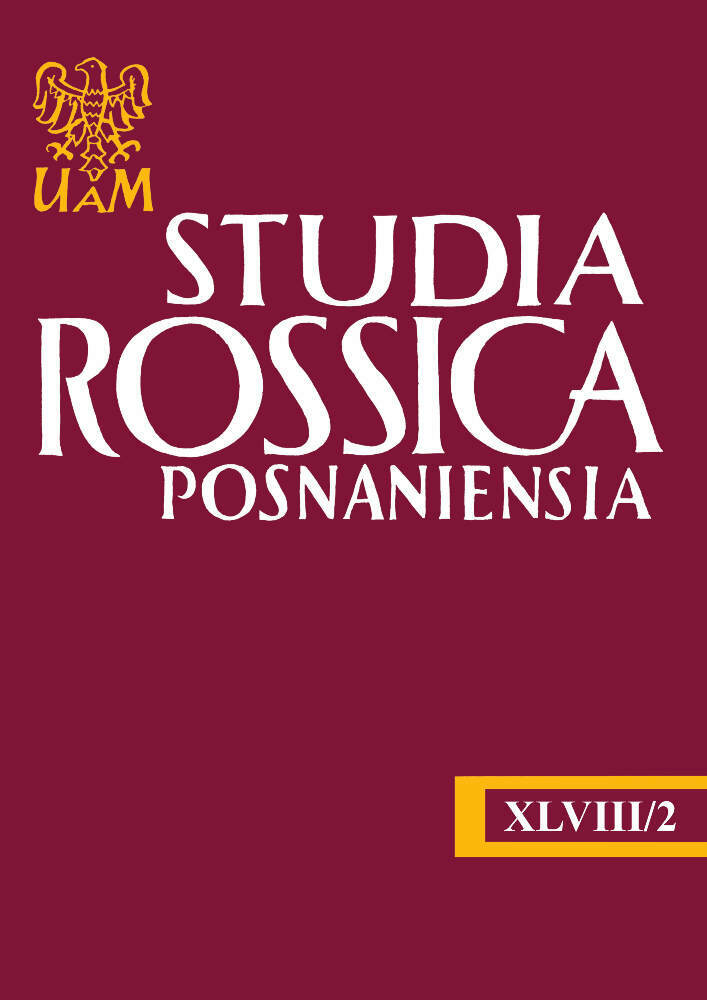Abstract
This article analyses Polish nouns denoting selected positive emotional states in comparison to their equivalents in the Russian text. The factual material was taken from Katarzyna Kołczewska’s book entitled Kto, jak nie ja? and its translation into Russian, and includes sentences containing the above-mentioned nouns and their equivalents from the target text. The conducted analysis allows us to state that the nouns denoting emotions recorded in translation dictionaries, despite the presence of exact equivalents, are translated by means of lexemes modifying their meaning both in the quantitative aspect (by using lexemes indicating emotional states of higher or lower intensity), as well as in the qualitative aspect. In addition, the emotional meaning of selected nouns is conveyed in the target text by means of words referring to other parts of speech, often co-occurring with the main dictionary equivalent. The study has shown that despite the presence of established equivalents in translation dictionaries, the meaning of nouns naming selected positive emotions is conveyed in different ways in the Russian translation text. The presented repertoire of textual equivalents is by no means complete and final. The study concludes that the repertoire remains open, and textual realizations are not always consistent with the equivalents proposed by the dictionary.
References
Аpresân, Ûrij. „Obraz čeloveka po danym âzyka: popytka sistemnogo opisaniâ”. Voprosy âzykoznaniâ, 1, 1995, s. 37–67.
Babenko, Lûdmila. Leksičeskie sredstva oboznačeniâ èmocij. Sverdlovsk, Izdatelʹstvo Uralʹskogo universiteta, 1989.
Borek, Małgorzata. Uczucia i emocje w rosyjskich i polskich metaforach. Aspekt lingwistyczny. Katowice, Uniwersytet Śląski w Katowicach–Oficyna Wydawnicza Wacław Walasek, 2012.
Chudyk, Dorota. „Rosyjskie i polskie konstrukcje porównawcze z przymiotnikami nazywającymi barwę pomarańczową (semantyka, struktura, składnia)”. Zeszyty Naukowe Uniwersytetu Rzeszowskiego. Seria Filologiczna. Glottodydaktyka, 5, 2013, s. 9–19.
Czapiga, Zofia. „O ekspresywności wypowiedzeń emotywnych (na materiale języka rosyjskiego i polskiego)”. Acta Universitatis Lodziensis. Folia Linguistica Rossica, 11, 2015, s. 19–27. DOI: https://doi.org/10.18778/1731-8025.11.03
Data, Krystyna. „W jaki sposób językoznawcy opisują emocje?”. Język a Kultura. T. 14: Uczucia w języku i tekście. Red. Iwona Nowakowska-Kempna, Anna Dąbrowska, Janusz Anusiewicz. Wrocław, Wydawnictwo Uniwersytetu Wrocławskiego, 2000, s. 245–252.
Gak, Vladimir. „Èmocii i ocenki v strukture vyskazyvaniâ i teksta”. Vestnik MGU, 3, ser. 9, s. 87–95.
Grabias, Stanisław. O ekspresywności języka: ekspresja a słowotwórstwo. Lublin, Wydawnictwo Lubelskie, 1981.
Izard, Kèrrol Èllis. Èmocii čeloveka. Moskva, Izdatelʹstvo MGU, 1980.
Kamalova, Аllа, Gennady Berestnev. „Èmocii kak predmet lingvističeskogo izučeniâ (na materiale russkogo âzyka)”. Przegląd Wschodnioeuropejski, 10 (2), 2019, s. 349–360. DOI: https://doi.org/10.31648/pw.5486
Kolčevsʹka, Katažina. Kto esli ne â. Przeł. Alëna Galicka. Belgorod, Izdatelʹstvo klub semejnogo dosuga, 2016.
Kołczewska, Katarzyna. Kto, jak nie ja?. Warszawa, Prószyński i S-ka, 2013.
Kožina, Margarita, Lidiâ Duskaeva, Vladimir Salimovskij. Stilistika russkogo âzyka. Učebnik. Moskva, Flinta, Nauka, 2011.
Łątka, Elżbieta. „Czy mówienie o emocjach w języku obcym jest możliwe? O potrzebie rekonstruowania skryptów kulturowych wyrażania emocji dla glottodydaktyków polszczyzny”. Acta Universitatis Lodziensis. Kształcenie Polonistyczne Cudzoziemców, 19, 2012, s. 35–43.
Orzechowska, Joanna. „Émotivnyj komponent značeniâ prilagatel’nyh v russkom âzyke”. Przegląd Wschodnioeuropejski, 11 (1), 2020, s. 407–416. DOI: https://doi.org/10.31648/pw.5998
Popowicz, Joanna. RADOŚĆ we współczesnym języku hiszpańskim i polskim. Kognitywna analiza semantyczna wybranych leksemów. Kraków, Towarzystwo Utworów i Wydawców Prac „Universitas”, 2018.
Wierzbicka, Anna. Kocha, lubi, szanuje. Medytacje semantyczne. Warszawa, Państwowe Wydawnictwo Wiedza Powszechna, 1971.
License
Copyright (c) 2023 Anna Rudyk

This work is licensed under a Creative Commons Attribution-NonCommercial-ShareAlike 4.0 International License.

